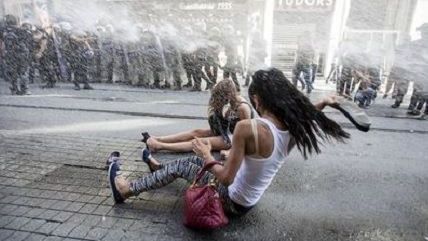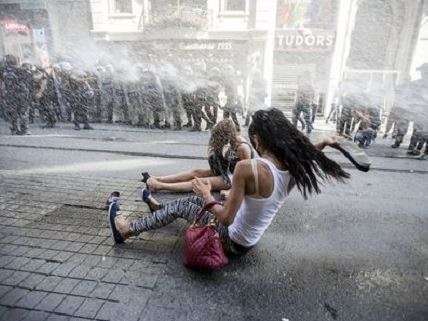Turkish Police Crack Down on Gay Pride Parade That Was Canceled Due to Ramadan
Activists say government crack down was meant to gain support for the government.


Riot police in Turkey used pepper spray, water cannons, and rubber pellets to break up a gay pride parade in Istanbul that's been an annual tradition for at least the last decade but was not permitted by local authorities this year because it fell during Ramadan, the Muslim holy month of fasting.
CNN reports:
Paradegoers continued to celebrate in the side streets, as riot police chased other attendees from arteries of Istanbul's main commercial district of Taksim.
One video shows a gay pride attendee being swept off his feet with the force of a water cannon.
Two years ago, a protest over the tearing down of a park in Taksim led to the largest anti-government protests Turkey had seen since the Islamist-oriented Justice and Development Party (AK) was first voted into power in 2002. Police cracked down on the protests and eventually they went away. But this month, for the first time since starting to compete in elections, AK failed to win an outright majority.
Opponents of the government say it's not only homophobia animating this weekend's crack down but an attempt to shore up the government's popularity.
Via CNN:
Activists say they weren't just targeted because of their sexual orientation or fight for equality, but because Turkey's government wants to silence all minorities and anyone officials perceives as a threat to the conservative ruling Justice and Development Party…
CNN spoke to many sources who felt that the crackdown on Sunday's march was an attempt to appeal to Erdogan's conservative base.
"This is happening after the elections because they realize the power of the LGBTI movement," said transgender activist Ruzgar Buski. "Erdogan's government has lost their power and they know the LGBTI community stands with other minorities."
Is the government's effort at scapegoating working? CNN found a man on the street that suggested yes:
A man approached her and yelled, "Shut up and go away!" He told CNN that he did not like gay people and they were causing problems in Turkey, and then stressed that the country is Muslim and, to him, being Muslim and gay were in conflict.
The clashes with police came after Friday's ruling by the U.S. Supreme Court in support of same-sex marriage, which LGBTI activists in Turkey celebrated.
Gay, trans and intersex people in Turkey say they aren't at the stage where they could imagine that kind of equality in their country.
"We are at the stage of 'Please don't kill us,'" said Sevval Kilic, a transgender activist who helped organize the pride parade. "We don't discuss equal marriage or employment rights or whatever. We are just demanding our basic human rights."
While Turkey does not recognize same-sex marriage or permit gays and lesbians to serve openly in the military, homosexual activity has been generally legalized in the land now known as Turkey since the 1850s, when it was ruled by the Ottoman Empire, and there has been a right to change your legal gender since 1988. There are about 50 majority Muslim countries in the world—seven of them attach the death penalty in some manner to criminalized homosexual activity. Thirty two of them criminalize homosexuality in some form, including some countries, like Palestine, Kuwait, and Uzbekistan, that only prohibit male homosexuality.


Show Comments (50)